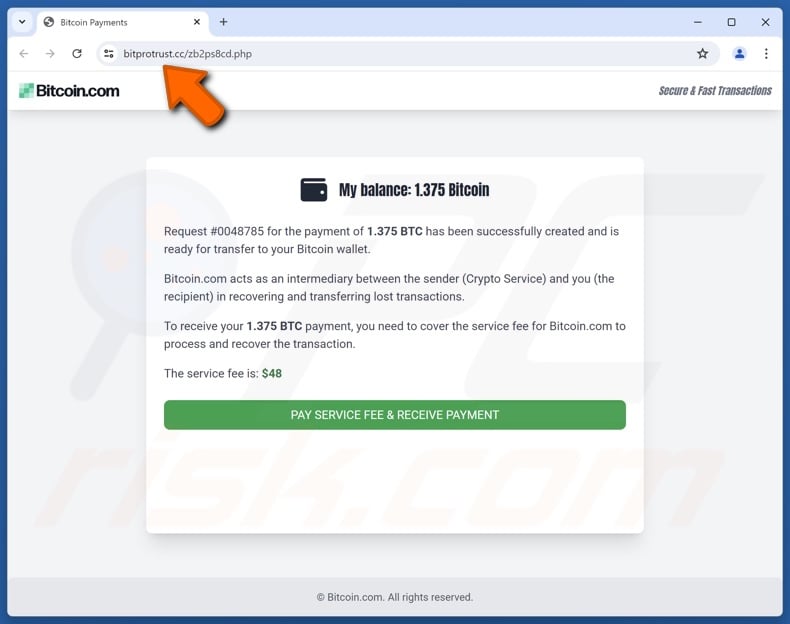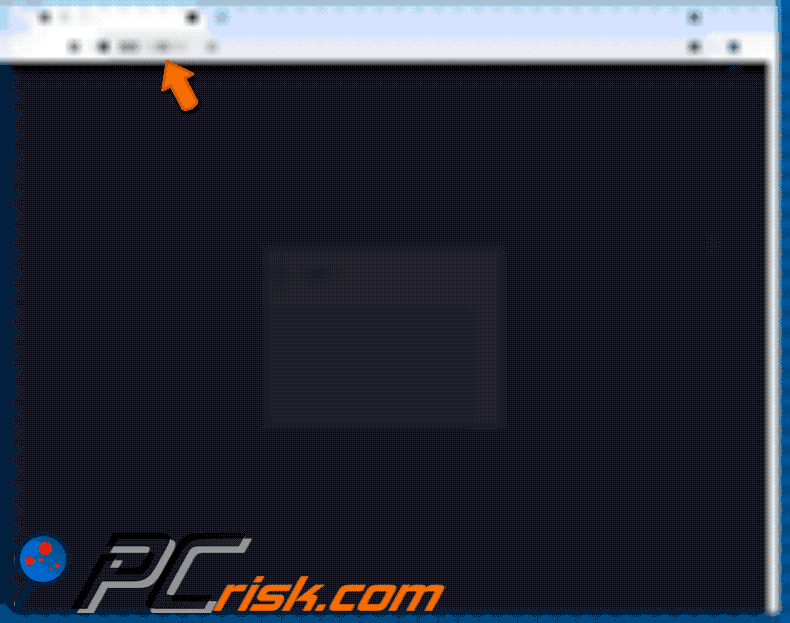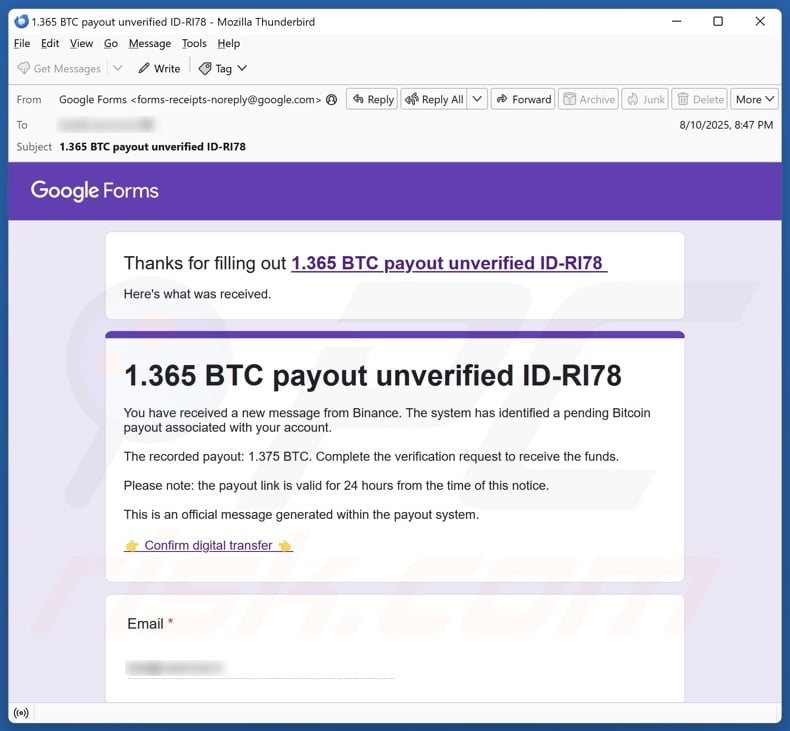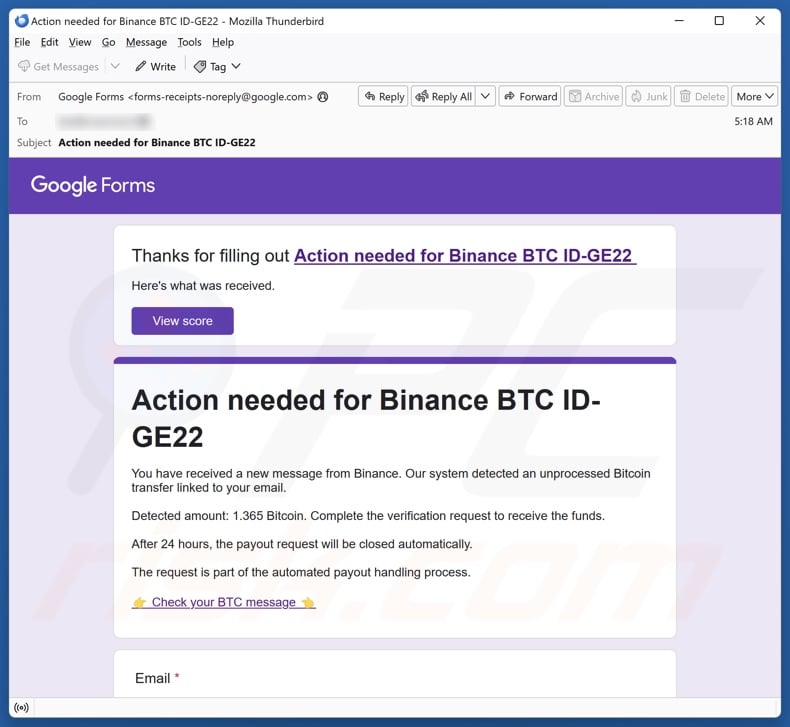How to identify scams like "Bitcoin.com - 1 New Transaction Has Been Sent"
Phishing/ScamAlso Known As: "Bitcoin.com - 1 New Transaction Has Been Sent" scam website
Get free scan and check if your device is infected.
Remove it nowTo use full-featured product, you have to purchase a license for Combo Cleaner. Seven days free trial available. Combo Cleaner is owned and operated by RCS LT, the parent company of PCRisk.com.
What is the "Bitcoin.com - 1 New Transaction Has Been Sent" scam?
Our researchers discovered the "Bitcoin.com - 1 New Transaction Has Been Sent" scam while investigating spam emails. This scam claims that the user has an exorbitant incoming Bitcoin transfer, which they can receive after handling the service fee. The goal is to deceive victims into sending money to scammers.

IMPORTANT NOTE: We do not review crypto projects, please do your own research when investing money.
Federal Trade Commission (FTC) states that since the start of 2021, more than 46,000 people have reported losing over $1 billion in crypto to scams – that's about one out of every four dollars reported lost, more than any other payment method.
"Bitcoin.com - 1 New Transaction Has Been Sent" scam overview
At the time of research, this scam was promoted through spam campaigns. We found two email versions with different text but conveying the same message.
These emails claim that recipients have a new message from Binance regarding an unprocessed Bitcoin transfer to their account. The sums vary – listed as either 1.365 or 1.375 BTC (Bitcoin cryptocurrency); note that the amounts may differ in general. At the time of writing, these sums are worth over one hundred sixty thousand USD (keep in mind that conversion rates fluctuate constantly).
The emails lead users to a deceptive "Bitcoin" page presented as a support chat. The initial messages resume the narrative established by the spam mail and ask whether the user wishes to complete the procedure to receive the payout. The user is presented with a "Yes or No" choice, and afterward is queried about other details with drop-down menus to select their responses. Lastly, they are informed that they must provide the correct information and follow "service instructions".
The following page asks the user to enter their cryptowallet address. Afterward, the next webpage states that 1.375 BTC is ready for transfer to the wallet after the service fee – 48 USD – is paid (sums may vary). When we investigated this scam, the next site showed an error, yet this could potentially be rectified by the scammers. By following through with this supposed procedure, victims are tricked into sending their funds to scammers.
It must be emphasized that this scam is not associated with Binance, Bitcoin, or any other legitimate platforms or entities. It must also be mentioned that cryptocurrency transactions cannot be reversed because they are practically untraceable. Therefore, victims of scams like "Bitcoin.com - 1 New Transaction Has Been Sent" cannot recover the stolen assets.
| Name | "Bitcoin.com - 1 New Transaction Has Been Sent" scam website |
| Threat Type | Phishing, Scam, Social Engineering, Fraud |
| Fake Claim | User has an unprocessed incoming (1.365/1.375 BTC) transfer. |
| Related Domains | bitprotrust[.]cc |
| Detection Names | Combo Cleaner (Phishing), ESET (Phishing), G-Data (Phishing), Sophos (Phishing), VIPRE (Phishing), Full List Of Detections (VirusTotal) |
| Distribution methods | Compromised websites, social media spam, rogue online pop-up ads, potentially unwanted applications. |
| Damage | Monetary loss |
| Malware Removal (Windows) |
To eliminate possible malware infections, scan your computer with legitimate antivirus software. Our security researchers recommend using Combo Cleaner. Download Combo CleanerTo use full-featured product, you have to purchase a license for Combo Cleaner. 7 days free trial available. Combo Cleaner is owned and operated by RCS LT, the parent company of PCRisk.com. |
Crypto scam examples
We have investigated countless cryptocurrency-targeting scams, and they have three predominant modes of operation – tricking users into manually transferring assets to scammer-owned wallets, phishing for wallet log-in credentials, or using draining mechanisms to siphon funds from exposed wallets.
"NAYM Token Airdrop", "Plume Airdrop", "Crypto Paper Hands", fake "Cryptowallet Resolver" website, "Succinct Rewards", "Qubetics Airdrop", "Avalanche (AVAX) Airdrop", and fake "Fluid.io" website are merely some of our latest articles on crypto scams.
Online scams may be competently made and convincingly disguised as content associated with legitimate entities; some may even perfectly copy the design of legitimate sites. Therefore, we strongly advise vigilance when browsing and investing.
How did I open a scam website?
The "Bitcoin.com - 1 New Transaction Has Been Sent" scam was endorsed via email spam campaigns. However, it could be pushed using other promotional techniques.
Online scams are commonly endorsed via different types of spam (e.g., browser notifications, social media/ forum posts, PMs/DMs, SMSes, robocalls/ cold calls, etc.), websites utilizing rogue advertising networks (redirects), malvertising (intrusive adverts), typosquatting (misspelled URLs), and adware (ads/redirects).
How to avoid visiting scam websites?
Caution is essential to ensuring your online safety. Therefore, be wary of communications, websites, and advertisements that make unbelievable promises or warn about severe threats. Take note of URLs and enter them carefully. Do not permit sites offering pirated content or other questionable services (e.g., illegal streaming/downloading, Torrenting, etc.), as these webpages typically employ rogue advertising networks.
Do not enable suspect pages to display browser notifications; instead, ignore or deny their requests (i.e., click "Block", "Block Notifications", etc.). Approach incoming emails and other messages cautiously; do not open attachments or links found in dubious/irrelevant mail.
Download only from official/trustworthy sources and be attentive when installing (e.g., read terms, explore options, use "Custom/Advanced" settings, and opt out of additional apps, extensions, etc.) – to prevent bundled/hazardous software (like adware) from infiltrating the system.
If your computer is already infected, we recommend running a scan with Combo Cleaner Antivirus for Windows to automatically eliminate all threats.
Text presented by the "Bitcoin.com - 1 New Transaction Has Been Sent" scam:
Bitcoin.com
Secure & Fast Transactions
My balance: 1.375 Bitcoin
Request #0048785 for the payment of 1.375 BTC has been successfully created and is ready for transfer to your Bitcoin wallet.
Bitcoin.com acts as an intermediary between the sender (Crypto Service) and you (the recipient) in recovering and transferring lost transactions.
To receive your 1.375 BTC payment, you need to cover the service fee for Bitcoin.com to process and recover the transaction.
The service fee is: $48
PAY SERVICE FEE & RECEIVE PAYMENT
© Bitcoin.com. All rights reserved.
Appearance of the "Bitcoin.com - 1 New Transaction Has Been Sent" scam (GIF):

Screenshot of an email promoting "Bitcoin.com - 1 New Transaction Has Been Sent":

Text presented in this email letter:
Google Forms
Thanks for filling out 1.365 BTC payout unverified ID-RI78
Here's what was received.1.365 BTC payout unverified ID-RI78
You have received a new message from Binance. The system has identified a pending Bitcoin payout associated with your account.
The recorded payout: 1.375 BTC. Complete the verification request to receive the funds.
Please note: the payout link is valid for 24 hours from the time of this notice.
This is an official message generated within the payout system.
Confirm digital transfer
Screenshot of another email promoting "Bitcoin.com - 1 New Transaction Has Been Sent":

Text presented in this email letter:
Google Forms
Thanks for filling out Action needed for Binance BTC ID-GE22
Here's what was received.View score
Action needed for Binance BTC ID-GE22
You have received a new message from Binance. Our system detected an unprocessed Bitcoin transfer linked to your email.
Detected amount: 1.365 Bitcoin. Complete the verification request to receive the funds.
After 24 hours, the payout request will be closed automatically.
The request is part of the automated payout handling process.
Check your BTC message
Instant automatic malware removal:
Manual threat removal might be a lengthy and complicated process that requires advanced IT skills. Combo Cleaner is a professional automatic malware removal tool that is recommended to get rid of malware. Download it by clicking the button below:
DOWNLOAD Combo CleanerBy downloading any software listed on this website you agree to our Privacy Policy and Terms of Use. To use full-featured product, you have to purchase a license for Combo Cleaner. 7 days free trial available. Combo Cleaner is owned and operated by RCS LT, the parent company of PCRisk.com.
Quick menu:
- What is "Bitcoin.com - 1 New Transaction Has Been Sent" scam website?
- How to identify a pop-up scam?
- How do pop-up scams work?
- How to remove fake pop-ups?
- How to prevent fake pop-ups?
- What to do if you fell for a pop-up scam?
How to identify a pop-up scam?
Pop-up windows with various fake messages are a common type of lures cybercriminals use. They collect sensitive personal data, trick Internet users into calling fake tech support numbers, subscribe to useless online services, invest in shady cryptocurrency schemes, etc.
While in the majority of cases these pop-ups don't infect users' devices with malware, they can cause direct monetary loss or could result in identity theft.
Cybercriminals strive to create their rogue pop-up windows to look trustworthy, however, scams typically have the following characteristics:
- Spelling mistakes and non-professional images - Closely inspect the information displayed in a pop-up. Spelling mistakes and unprofessional images could be a sign of a scam.
- Sense of urgency - Countdown timer with a couple of minutes on it, asking you to enter your personal information or subscribe to some online service.
- Statements that you won something - If you haven't participated in a lottery, online competition, etc., and you see a pop-up window stating that you won.
- Computer or mobile device scan - A pop-up window that scans your device and informs of detected issues - is undoubtedly a scam; webpages cannot perform such actions.
- Exclusivity - Pop-up windows stating that only you are given secret access to a financial scheme that can quickly make you rich.
Example of a pop-up scam:

How do pop-up scams work?
Cybercriminals and deceptive marketers usually use various advertising networks, search engine poisoning techniques, and shady websites to generate traffic to their pop-ups. Users land on their online lures after clicking on fake download buttons, using a torrent website, or simply clicking on an Internet search engine result.
Based on users' location and device information, they are presented with a scam pop-up. Lures presented in such pop-ups range from get-rich-quick schemes to fake virus scans.
How to remove fake pop-ups?
In most cases, pop-up scams do not infect users' devices with malware. If you encountered a scam pop-up, simply closing it should be enough. In some cases scam, pop-ups may be hard to close; in such cases - close your Internet browser and restart it.
In extremely rare cases, you might need to reset your Internet browser. For this, use our instructions explaining how to reset Internet browser settings.
How to prevent fake pop-ups?
To prevent seeing pop-up scams, you should visit only reputable websites. Torrent, Crack, free online movie streaming, YouTube video download, and other websites of similar reputation commonly redirect Internet users to pop-up scams.
To minimize the risk of encountering pop-up scams, you should keep your Internet browsers up-to-date and use reputable anti-malware application. For this purpose, we recommend Combo Cleaner Antivirus for Windows.
What to do if you fell for a pop-up scam?
This depends on the type of scam that you fell for. Most commonly, pop-up scams try to trick users into sending money, giving away personal information, or giving access to one's device.
- If you sent money to scammers: You should contact your financial institution and explain that you were scammed. If informed promptly, there's a chance to get your money back.
- If you gave away your personal information: You should change your passwords and enable two-factor authentication in all online services that you use. Visit Federal Trade Commission to report identity theft and get personalized recovery steps.
- If you let scammers connect to your device: You should scan your computer with reputable anti-malware (we recommend Combo Cleaner Antivirus for Windows) - cyber criminals could have planted trojans, keyloggers, and other malware, don't use your computer until removing possible threats.
- Help other Internet users: report Internet scams to Federal Trade Commission.
Frequently Asked Questions (FAQ)
What is an online scam?
Online scams are scams that are promoted on the Internet. They aim to trick users into performing specific actions, such as making monetary transactions, disclosing sensitive data, connecting digital wallets to drainers, downloading/installing software, purchasing products, subscribing services, etc.
What is the purpose of online scams?
Online scams are designed to generate revenue for scammers. They primarily profit by acquiring funds through deception, endorsing websites/products/services, abusing/selling private data, and proliferating malware.
I have lost digital assets to an online scam, can I get my money back?
Cryptocurrency transactions are irreversible because they are nearly untraceable. Therefore, victims of such scams cannot get their money back.
Why do I encounter online scams?
Online scams are most commonly endorsed via spam (e.g., emails, social media posts, PMs/DMs, robocalls/ cold calls, SMSes, etc.), webpages using rogue advertising networks, misspelled URLs, intrusive ads, and adware.
Will Combo Cleaner protect me from online scams?
Combo Cleaner can scan visited websites and detect rogue, deceptive, and malicious pages. It can also deny further access to such webpages.
Share:

Tomas Meskauskas
Expert security researcher, professional malware analyst
I am passionate about computer security and technology. I have an experience of over 10 years working in various companies related to computer technical issue solving and Internet security. I have been working as an author and editor for pcrisk.com since 2010. Follow me on Twitter and LinkedIn to stay informed about the latest online security threats.
PCrisk security portal is brought by a company RCS LT.
Joined forces of security researchers help educate computer users about the latest online security threats. More information about the company RCS LT.
Our malware removal guides are free. However, if you want to support us you can send us a donation.
DonatePCrisk security portal is brought by a company RCS LT.
Joined forces of security researchers help educate computer users about the latest online security threats. More information about the company RCS LT.
Our malware removal guides are free. However, if you want to support us you can send us a donation.
Donate
▼ Show Discussion